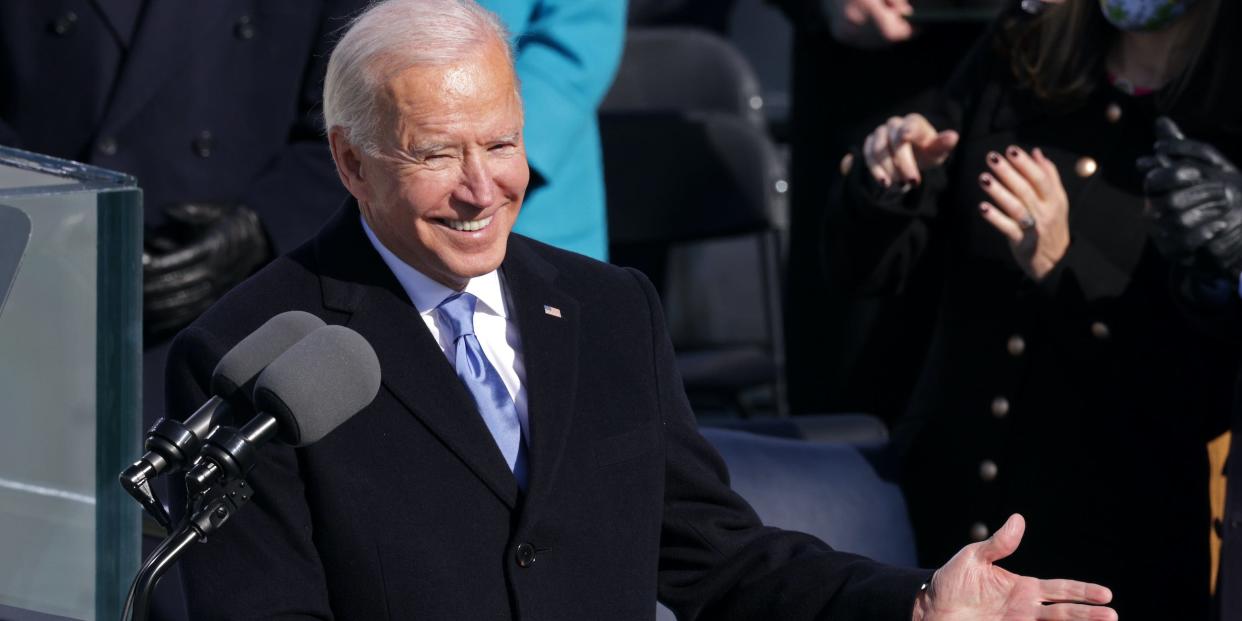'Democracy has prevailed': President Biden says 'unity is the path forward' in inaugural address

- Oops!Something went wrong.Please try again later.
Joe Biden, now the 46th president of the US, delivered a solemn inaugural address on Wednesday.
From the same stage that rioters overtook two weeks ago, Biden made a plea for unity and called to "end this uncivil war."
"To overcome these challenges, to restore the soul and secure the future of America, requires so much more than words," he said. "It requires the most elusive of all things in a democracy: unity."
Speaking from the same stage that insurrectionists overran two weeks ago, President Joe Biden called for unity and perseverance in his inaugural address on Wednesday.
"To overcome these challenges, to restore the soul and secure the future of America, requires so much more than words," Biden said. "It requires the most elusive of all things in a democracy: unity."
Building on the foundational theme of his campaign, Biden urged Americans to come together and bring down the temperature in national politics.
"We can join forces, stop the shouting, and lower the temperature," the president said. "For without unity there is no peace, only bitterness and fury; no progress, only exhausting outrage; no nation, only a state of chaos."
He added: "This is our historic moment of crisis and challenge, and unity is the path forward. And we must meet this moment as the United States of America."
Biden also underscored the immense challenges facing the country, including a pandemic that has killed more than 402,000 Americans, surging unemployment, and an attempted coup that left the nation's capital under a military occupation so that the new president could be inaugurated without incident.
"At this hour, my friends, democracy has prevailed," Biden said. "So now, on this hallowed ground where just a few days ago violence sought to shake the Capitol's very foundation, we come together as one nation, under God, indivisible, to carry out the peaceful transfer of power as we have for more than two centuries."
Biden's journey to the inauguration stage was an emotional one. Before leaving his home state of Delaware for the nation's capital on Tuesday, Biden broke down in tears while thinking of his son Beau, who died of brain cancer at the age of 46 in 2015.
Beau died amid speculation that Biden would run for president in 2016. He didn't then, but he ultimately decided to run for the third time in 2020 because of what he saw in Charlottesville, Virginia, in the summer of 2017.
His central campaign platform became "restoring the soul of the nation." Biden presented himself in a crowded Democratic field as a unifier who could appeal to disaffected working-class white voters who abandoned the party in 2016 and tipped the scales for Trump against Hillary Clinton.
"I know speaking of unity can sound to some like a foolish fantasy these days," Biden said in his address on Wednesday.
Asking the American people to bear with him, the new president laid out their common anxieties and how to overcome them.
"Look, I understand that many of my fellow Americans view the future with fear and trepidation," Biden said. "I understand they worry about their jobs. I understand, like my dad, they lay in bed at night, staring at the ceiling, wondering 'Can I keep my healthcare? Can I pay my mortgage?' Thinking about their families, about what comes next.
"I promise you I get it," he continued. "But the answer is not to turn inward, to retreat into competing factions, distrusting those who don't look like you, or worship the way you do, or don't get their news from the same sources you do."
Biden described the nation's predicament as an "uncivil war."
"We must end this uncivil war that pits red against blue, rural versus urban, conservative versus liberal. We can do this if we open our souls instead of hardening our hearts, if we show a little tolerance and humility, and if we're willing to stand in the other person's shoes, as my mom would say, just for a moment."
Read the original article on Business Insider

